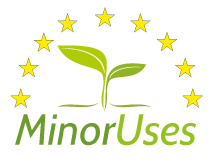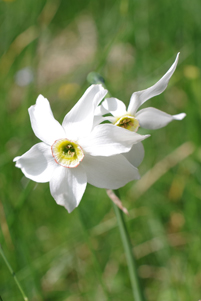|
|

MUCF Newsletter
n° 16 - April 2022
|
|
|
|
From the Coordinator
Spring has sprung here in France, and the MUCF team hopes you had an excellent start to the new growing season. We are also hereby pleased to be circulating our 16th newsletter, providing an update on some of our work done so far and announcements for the months to come.
|
|
Engagement with experts was a key goal for the MUCF team in the first few months of 2022, and I am proud to report that a total of 245 participants attended our multi-day commodity and horizontal expert group online meetings in late February and early March.
I would like to thank all the MUCF experts for their continued support and contributions to the MUCF work during the meetings and beyond.
We look forward with hope and promise to fruitful MUCF Autumn 2022 meetings.
Barbara Edler
Coordinator
|
|

Narcissus poeticus subsp. radiflorus
©Burkhard Leitner
|
|
|
|
|
|

The MUCF thanks all the presenters who prepared presentations and answered questions from the participants during the CEG and HEG Spring 2022 meetings. Presentations in PowerPoint or PDF format have been uploaded on the "MUCF Extranet" and on the MUCF website if authorisation was granted by the author(s).
MUCF spring meeting statistics:
- 8 CEG meetings and 1 HEG meeting
- 245 participants in total
- Experts from 28 European countries present
- Registered participants from 19 different organisations (e.g. International Biocontrol Manufacturers Association, Copa*Cogeca, Euroseeds, Agriculture and Horticulture Development Board)
In general, presenters and participants appreciated the convenience of the online meeting format, but many expressed the wish that in-person meetings would soon be possible.
Change in Chairing and co-Chairing of several commodity expert groups:
The MUCF would like to thank the resigning Chair(s) and co-Chair(s) for their excellent work in leading working groups for the past years and the new Chairs and co-Chairs for supporting the continuation of the workgroups by taking over these positions.
- Ms Magda Rak-Cizej (SI) was elected as Chair, and Mr Simon Euringer (DE) as co-Chair of the CEG Hops on 2022-03-23. The MUCF would like to thank the resigning Chair, Mr Florian Weihrauch (DE), for his work leading the working group until 2022.
- The MUCF would like to thank Mr Jean-Claude Malet (FR) in leading the CEG Fruits and Vegetables till 2022. He will attend the CEG meeting for Fruit and Vegetables for the last time in autumn.
Ms Gabriele Leinhos (DE) will co-chair CEG Vegetables, section Fungicides and Insecticides together with Ms Sara Ragnarsson (SE) as her alternate, Ms Vittore Shala-Mayrhofer (AT) will co-chair CEG Fruits, section Fungicides and Insecticides, and Mr Peter Hartvig (DK) will co-chair Fruits & Vegetables, section Weeds in future.
- The position of chairing the CEG Rice has remained vacant since Mr Cyrille Thomas (FR) stepped down from his position in December 2021. We would like to thank Mr Thomas for chairing CEG Rice from 2019 to 2021.
|
|
|

The MUCF and the Chair of the Horizontal Expert Group, Ms Jana Johansen-Hladilova, provided a short report from the Autumn HEG meeting:
The HEG meeting held on 2022-03-04 was attended by 59 experts from regulatory authorities, growers' associations, EPPO and the plant protection products industry associations.
The MUCF updated participants on the Explanatory Note on Minor Uses (ENMU) progress. Version 1 of the ENMU was presented at the December SCoPAFF meeting and was shared on CIRCABC for commenting. Comments were provided by Austria, Ireland, Slovenia, and Sweden. The 'Explanatory Note writing group' worked on the comments received from the 4 European Member states, and the document will be presented at SCoPAFF on 2022-03-30/31.
HEG experts will continue to work on this document to keep it updated. During the HEG meeting, experts expressed their wish to work on a simplified template for the assessment for minor use Article 51 applications (simplified draft Registration Report). A simplified draft Registration Report could facilitate and contribute to work-sharing among Member Countries. Establishing a small writing group on this task will be considered. For example, the Explanatory Note could be amended with a simplified draft Registration Report template in the next revision.
In 2021 the MUCF conducted surveys on minor/major crops, minor crop definition criteria, minor/major uses, and the table of needs circulated to 27 EU Member States plus the United Kingdom, Norway and Switzerland. The valuable information from the responses has been published and is now available in EUMUDA
The MUCF will conduct a new survey in 2022 about how Member Countries deal with the Article 51 applications and general minor uses topics. It is planned to update the 'Questionnaire on Minor Uses work in EU Member States, Norway and Switzerland' conducted in 2017 (https://minoruses.eu/media/files/resources/Report_Minor_Uses_work_MS.pdf). Several topics and questions will be added to the 2022 survey. Topics that were and are discussed within the HEG, such as mutual recognition, aspects of risk assessment or the criteria for defining a minor crop, will be included in the 2022 survey. The responses provided by the member countries will provide a starting point for further discussion.
Ms Anne Chapelle (FR) gave an informative presentation about the availability status of active substances in Europe, publicly accessible under: Availability of active substances in Europe (March 2022)
During the last HEG meetings, setting up a dedicated working group focusing on residue issues was discussed. Mr José Luis Alonso-Prados (ES) prepared a brief about what a potential MUCF Residue Expert Group (ReEG) could be working on. Draft terms of reference will be prepared for this possible future working group for the Autumn 2022 meeting, and it will be decided whether to set up the working group as a subgroup of the HEG or as a separate working group.
|
|
|
|
|

|
|
Update: Explanatory Note on Minor Uses endorsed.
The final document was presented at the SCoPAFF meeting Phytopharmaceutical-Legislation on 2021-03-31 and endorsed by the Committee. EU Member States are invited to provide a link to the Explanatory Note published on the MUCF website on their competent national authority website. The European Commission will also provide a link to the document on its website. For the time being, it will only be available in English.
The Explanatory Note provides comprehensive information on minor uses procedures in the context of the implementation of Article 51 and other provisions related to minor uses according to regulation (EC) No 1107/2009 for different parties such as authorisation holders, official or scientific bodies involved in agricultural activities, professional agricultural organisations, professional users and competent authorities, as well as for the MUCF Commodity Expert Groups and Horizontal Expert Groups.
|
|
|
The Explanatory Note on Minor Uses (COMPREHENSIVE INFORMATION ON MINOR USES PROCEDURES ACCORDING TO REGULATION (EC) No 1107/2009) is now publicly accessible under: https://minoruses.eu/resources/explanatory_note
|
|
|

The MUCF and the Chair assistant of CEG Fruits and Vegetables, Ms Anne Chapelle, provided a short report from the Spring CEG Fruits and Vegetable meeting:
CEG Fruits and Vegetables presented a detailed five-year work plan at the Spring meeting (2022-03-03/04).
The public version of this plan is accessible on the MUCF website, by clicking on this link.
In total, the CEG Fruits and Vegetables meeting consisted of four different sessions spread over two days:
A joint session for Fruits and Vegetable experts, dealing with general topics such as the five-year work plan of the group, an overview of the availability of active substances in the EU, and a study on Art. 53 authorisations.
A dedicated session for Fruits experts, with updates on projects concerning pests, diseases and weeds, and exchanges of information about attractants and pheromones. Ms José Gomes Laranjo (PT), from EUROCASTANEA, presented the work ongoing by the European chestnut network.
A dedicated session for Vegetable experts, with updates on projects concerning pests, diseases and weeds. The MRL situation concerning radish leaves was discussed in detail, and a follow-up meeting with the countries concerned will be organised in April to plan future actions on this issue.
A joint session for Vegetables and the CEG Seeds experts, with discussions about needs in the seed sector and the situation of seed treatments. Some joint projects are ongoing on seed treatment, such as vegetable flies, and projects on soil treatment were presented.
|
|
|

In February 2022, several pages were updated on the website of EUMUDA.
- On the home page (https://eumuda.minoruses.eu), definitions and criteria for minor crops and minor uses and their updated list of minor crops and minor uses are displayed from several MUCF member countries.
- The table of minor uses needs was updated and now contains information from 26 member countries (22 EU Member States, plus the United Kingdom, Norway, Switzerland and Macedonia). Over a total of 3500 grouped needs are displayed:
https://eumuda.minoruses.eu/database/table_minor_uses
The top needs highlighted are:
- Drosophila suzukii (DROSSU, spotted wing drosophila) on raspberry (reported by 19 countries in all three regulatory zones, prioritisation points 52)
- Peronospora destructor (PERODE, downy mildew ) on onion
(reported by 15 countries in all three regulatory zones, prioritisation points 47)
- Drosophila suzukii (DROSSU, spotted wing drosophila) on strawberry
(reported by 15 countries in all three regulatory zones, prioritisation points 46)
- Delia radicum (HYLERA, cabbage root fly) on white cabbage
(reported by 17 countries in all three regulatory zones, prioritisation points 41)
- Chamaepsila rosae (PSILRO, carrot fly) on carrot
(reported by 14 countries in all three regulatory zones, prioritisation points 41)
Needs are displayed in detail on a second webpage:
https://eumuda.minoruses.eu/database/table_minor_uses_detailed
On this page, member countries indicated if they have PPP solution(s) which have become available since they first declared a 'need' in EUMUDA.
Search instructions:
The MUCF encourages readers to use search settings to access additional solution information (e.g., PPPs or extrapolation possibilities) quickly.
- To do this use the 'priority setting' filter and indicate '0' (need solved).
- In addition, use the 'status' filter and select 'one solution available - but other solutions required' to access needs for which solutions have been found, but for which the need remains a priority in the country (i.e., because of existing resistance issues).
|
|
|

The MUCF will host the Autumn CEGs and HEG meetings as physical meetings as decided by the Chairs and co-Chairs of each expert working group.
We will hold the next MUCF autumn meetings at the Park Inn by Radisson Brussels Midi, Place Marcel Broodthaers 3, B-1060 Brussels, Belgium, from October 5th to October 7th, 2022 (CEGs 5th and 6th and HEG on the 7th).
For more updates about the upcoming meetings, please refer to our website: https://minoruses.eu/mucf/meetings
|
|
|

Hops news:
A meeting by the Scientific-Technical Commission of the International Hop Growers' Convention will be held in Lugo, Galicia, Spain, from 03 - 07 July 2022.
The registration for this meeting is still possible.
For more information about the meeting, please contact:
Dr Florian Weihrauch
Phone: +49 8161 8640-2332
E-mail: Florian.Weihrauch@LfL.bayern.de
|
|
|
|
|
|
|

|
|
Alert on minor uses:
A French cooperative producing hazelnuts has drawn attention to the fact that currently, only one active ingredient against the hazelnut weevil Curculio nucum (CURCNU) and the brown marmorated stink bug Halyomorpha halys (HALYHA) is authorised for the treatment of these pests in the hazelnut crop. This makes the alternate use of active substances for resistance management impossible.
|
|
|
The cooperative highlights that more authorised products are needed to control new pests that appear due to changing climatic conditions, to compensate for yield losses and to create a level of playing field for farmers producing hazelnuts in Europe compared to imported hazelnuts produced outside the EU.
For more information about this issue please refer to the original text in French: 'Usages mineurs: L'appel de la filière noisettes pour sortir de l'impasse technique', accessible under:
https://phyteis.fr/actualites/usages-mineurs-lappel-de-la-filiere-noisettes-pour-sortir-de-limpasse-technique/
|
|
|
|
|
